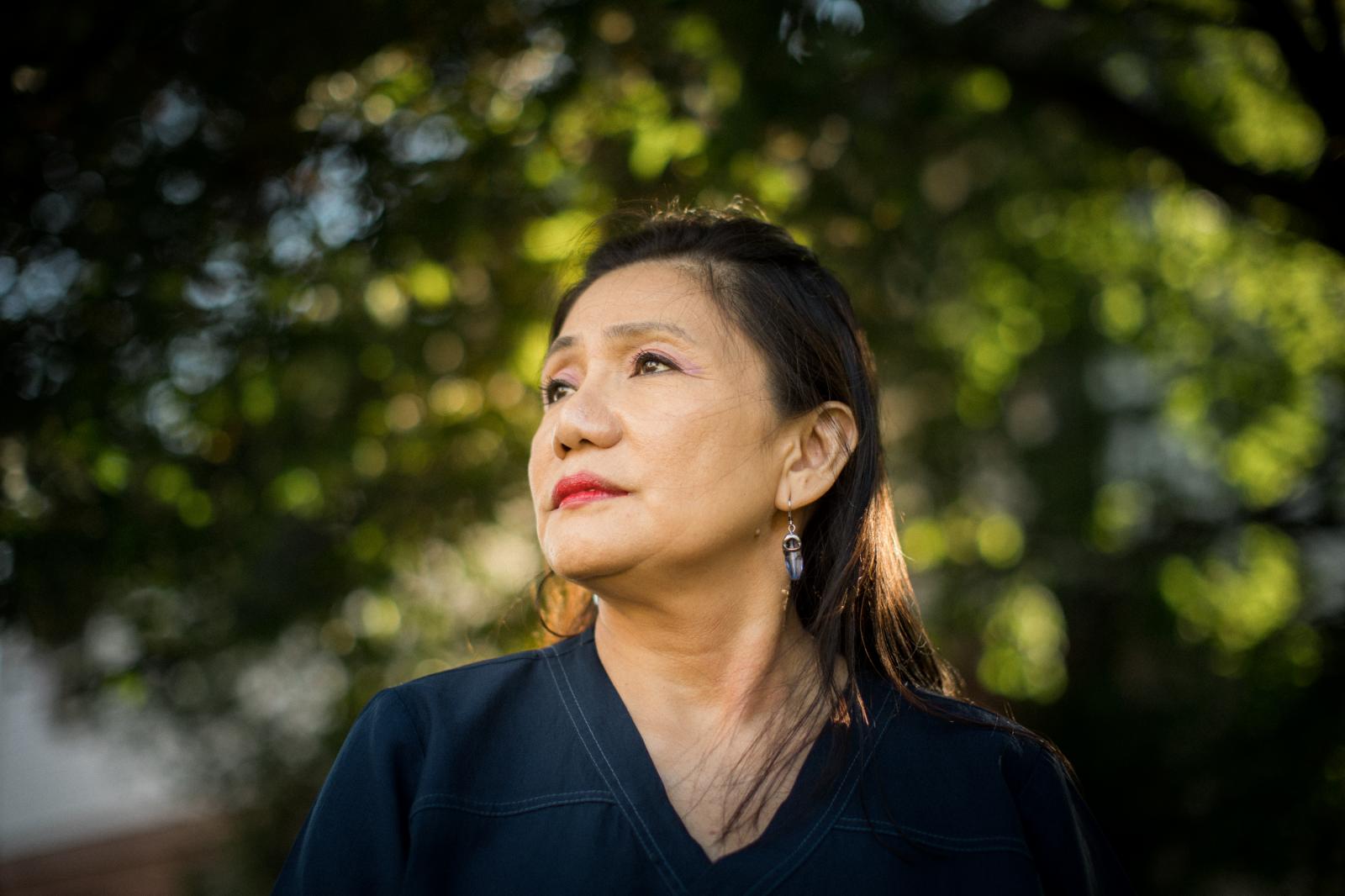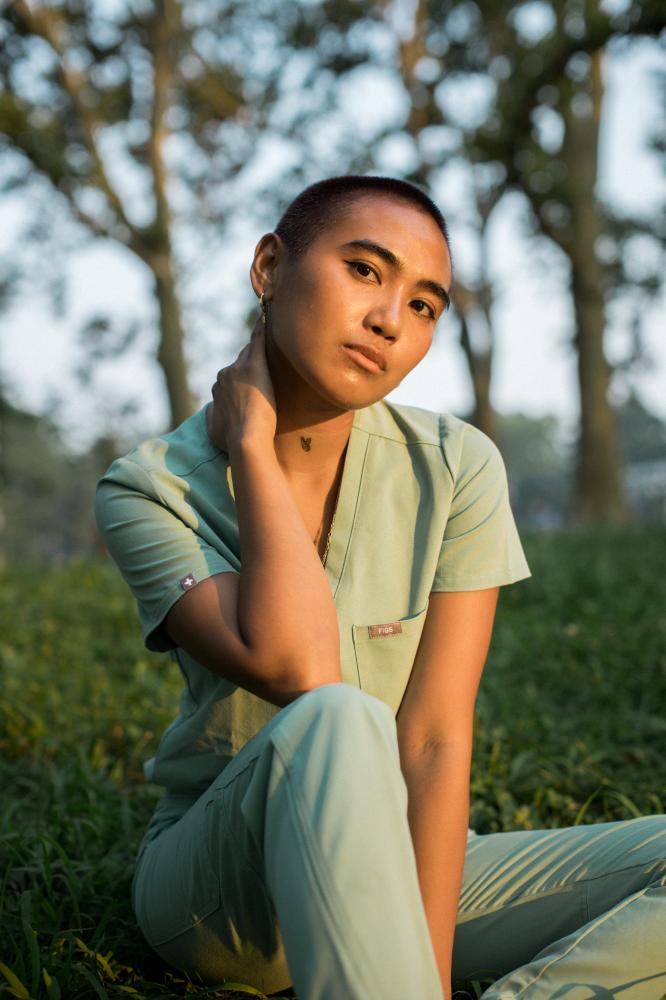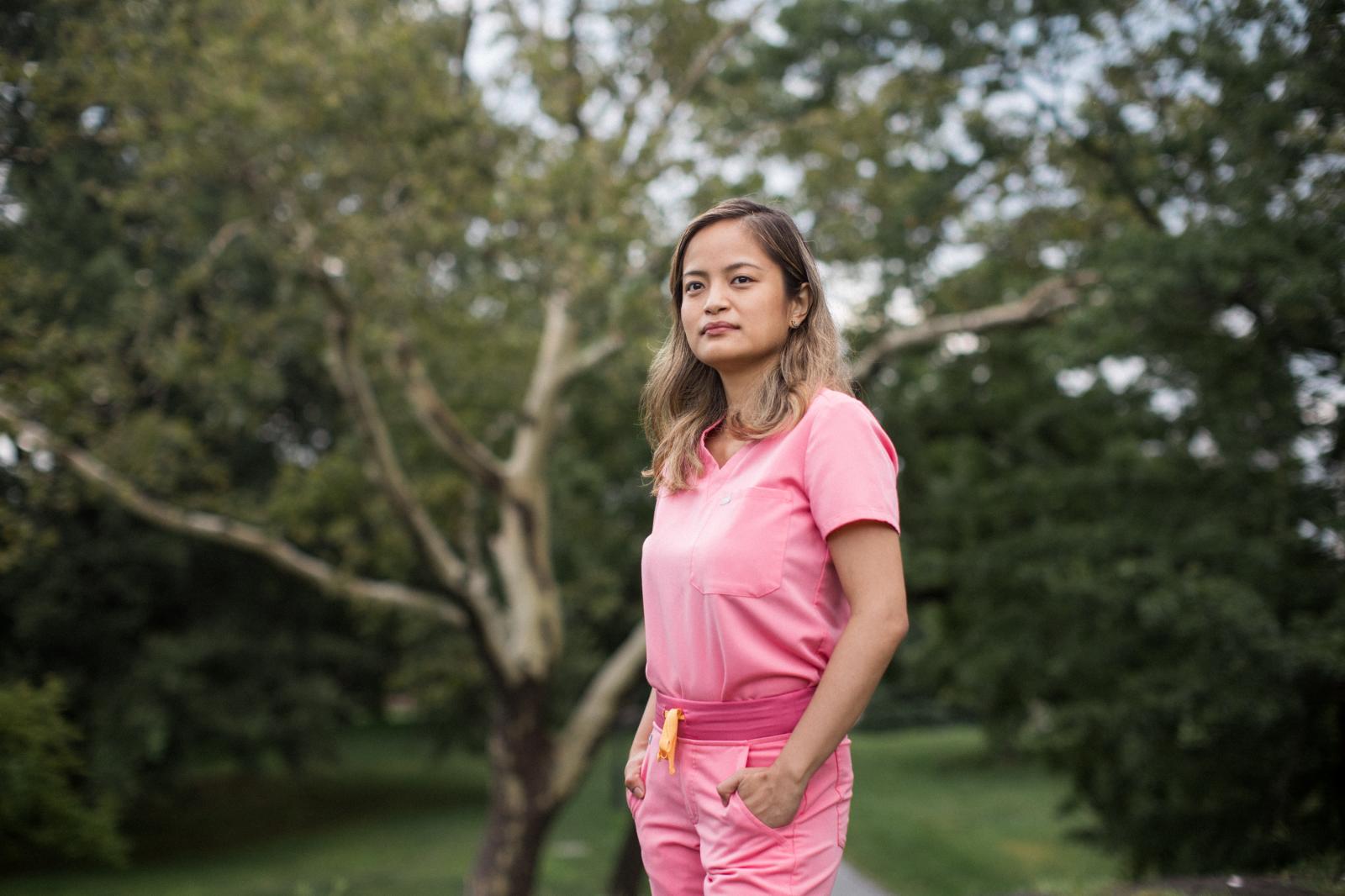
1 of 24
© 2025 Rosem Morton
Jona Caparas, Vascular Access Nurse
The heartache and helplessness I felt when my own brother was brought to the hospital was like no other. He was found passed out in his driveway and was diagnosed with subarachnoid bleed and tested positive for COVID-19. All I could do was get text updates because I couldn't leave my patients who were also dying and needed lines so they could survive. My brother died two days later. Around that time, five of my friends died as well.
After my brother died, things took a toll on me. I was crying and my glasses were fogging while I was trying to insert lines. It's tough. And then, of course, patients were dying in front of you. That was the most difficult time for me. It's still difficult.

3 of 24
© 2025 Rosem Morton
Karen Cantor, 27, Intensive Care Unit Nurse
We had nurses get sick. We had nurses die. We had family members of nurses die. We had to take care of their family members.
I wrote my will last year. It was cathartic — at least you had a plan. I needed a sense of control.
I didn't start seeing a therapist until like the beginning of this year. I don't think there were openings by the time I was looking. So, now I've started seeing a therapist, and unpacking, like, all of the traumas of last year.
![]()
5 of 24
© 2025 Rosem Morton
Bea Leal, 33, Internal Medicine Physician
I grew up in the Philippines in a family of doctors. My mom, my mom's
sisters, my cousins and my sister are in medicine. We don't know how to do
anything else.
When the pandemic happened, it was very unprecedented. You are fearing for your own life and for the life of your colleagues. You see the people around you — your colleagues were getting sick, were critical or even died. So I wondered, should I go back to the Philippines? Should I leave NY? Because things were so bad here compared to the rest of the world. Is it still worth it to sacrifice my life? Is it for a greener pasture? Is it for the opportunity to train abroad? Is it worth it to not see my family again?
![]()
7 of 24
© 2025 Rosem Morton
John Paul Atienza, 37, Respiratory Therapist
It was one person to multiple patients at one time. It was very overwhelming at one point and you just do what you have to do.
![]()
9 of 24
© 2025 Rosem Morton
Rhys Dela Cruz, 38, Nurse Anesthetist
We became the emergency airway team, line placement team, respiratory therapists, ICU nurses, technicians, medical team management, and unit facilitators. It was no longer just anesthesia.
I want people to understand that during the chaos of the surge, we held onto each other and took care of one another as a family.
![]()
11 of 24
© 2025 Rosem Morton
Glenn Magpili, 42, Emergency Room Nurse and Manager
When I got sick, I did not have family here. When I was admitted, I just bought tickets for my fiancé to come over from the Philippines. That was one of my last memories before I was intubated.
When I woke up, I thought I was just asleep for a couple of days. They told me it was almost four weeks.
I was one of the lucky ones. There were so many Filipino nurses who got sick.
This definitely changed my outlook in the way I treat my patients. I used to be a more technical nurse. I liked working in the trauma room. Now, I feel more empathy towards my patients. I speak to them more. I am more open to their needs. I became a better nurse because I was a patient, because I was one of them.
![]()
13 of 24
© 2025 Rosem Morton
Gemma Balagtas, 50, Medical-Surgical Nurse
On my very first shift after recovering from COVID, my patient coded. I had just recovered and now I am giving CPR. Because there were so many people coding, we just did not have much help. My chest started hurting and I thought I would be next.
That first shift after recovering from COVID was so difficult and I was so tired. I just wanted to give up and resign. But then, a bus stopped and the driver said “thank you.” This gave me encouragement and hope to go back to work and help people who are sick because they need me to be there. I will never forget that.
![]()
15 of 24
© 2025 Rosem Morton
Nicole Toledo, 30, Physical Therapist
When I felt burnt out … I would play with my son. Seeing him happy would take the stress away, but when I went back outside, it was a different story.
![]()
17 of 24
© 2025 Rosem Morton
Nicolo Firme, 37, Internal Medicine Physician
It's hard. For other diseases, at least you can give them answers, but during COVID we had no answers. Are they going to get better? Does this treatment work? When is my dad going to go home? When is my mom going to go home? We had no answers. Basically we would tell them that we were doing everything we can with what we know, but we had no definite answer for anybody.
It makes you feel like you’re exploring a new area of medicine -- and for anybody that's a scary feeling. It was like going into a dark room and feeling your way through the area. And we would give what we had, even if we were not sure if it would help or not.
I’m training here now, but I also trained in the Philippines. The work ethic -- how hard it is and the long work hours -- I learned from the Philippines. So I was able to carry that over here. That is what gave me the resilience to get through the worst of COVID.
![]()
19 of 24
© 2025 Rosem Morton
Christianne Calderon, 42, Critical Care Nurse Practitioner
I was defiant, I did not want to be defeated. I celebrated when our first patient was extubated and transferred. I looked ahead with optimism, tenacity and an indomitable spirit day after day since.
![]()
21 of 24
© 2025 Rosem Morton
Karen Shoker, 27, Emergency Medical Technician
I got sick in April, the same time as my aunt and uncle. One day, I just spoke to my aunt on FaceTime. The next day, the doctor let me know they were intubating her. Then that day, I got a call saying she passed away. At the same time, my uncle was in the hospital because of a stroke. So, I had to tell him that his wife passed away. I was also so sick. For almost a whole month, I had no energy. I felt so useless. My aunt’s gone. My uncle is sick.
Never take life for granted. As much as possible, spend whatever time you have with your loved ones, making memories and always make sure to tell your family members that you love them. That's one thing I wish I had told my aunt before she passed away. And that's something I know, she knows, I love her. I wish I had more time with her before she was gone. She was loved.
![]()
23 of 24
© 2025 Rosem Morton
Jane Dela Cruz, 46, Assistant Director of Nursing
Overnight, they created an ICU, and the next morning, we were there. The transition to not only be a leader but also be a bedside nurse and educator, all at the same time, was really challenging. It was back to back, every 5 to 10 minutes, from one room to the next with limited staff to help because we were trying to contain the virus and there was a shortage of PPE.
In the end, the administration staff asked me, how did I do it? I didn't do it. My staff did it because there's no other way, but to do it and to survive.












